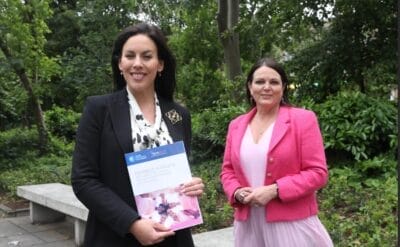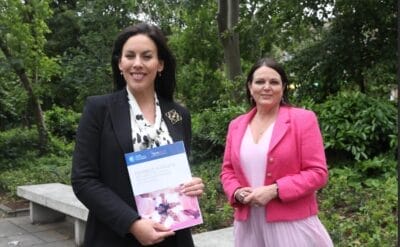
A groundbreaking new report, Femtech in Ireland: The Case for Prioritising Women’s Health Research and Innovation, has identified significant opportunities for Ireland to become a global leader in FemTech—technology, research, and innovation focused on women’s health. Produced by Health Innovation Hub Ireland (HIHI), and the Department of Obstetrics and Gynaecology at University College Cork (UCC) the report explores how improved support for women’s health innovation and entrepreneurship could unlock economic potential, address health inequities, and strengthen Ireland’s life sciences and technology sectors.
Image details Minister for Health, Dr. Jennifer Carroll McNeill TD and Dr. Tanya Mulcahy, Director of Health Innovation Hub Ireland and founder of FemTech Ireland.
Femtech growth in Women’s Health Research and Innovation
The report finds that, despite Ireland’s strong foundation in medtech, digital health, and pharmaceuticals, FemTech remains underdeveloped and underfunded. Globally, FemTech is projected to exceed €60 billion by 2027—but only a small fraction of health research funding and investment currently targets female-specific health conditions.
Key findings of the report include:
- Untapped market potential for startups and investors in women’s health innovation.
- Gaps in research funding limits progress.
- Opportunities for Ireland to lead globally by integrating FemTech into national health innovation strategies.
- Need for greater support entrepreneurs and researchers working in the FemTech space.
- FemTech attracts female entrepreneurs- more than 75% of FemTech companies have a female founder.
The report also highlights several key recommendations including the establishment of dedicated FemTech funding calls, inclusion of sex and gender analysis in research design, and establishing a FemTech innovation space.
For decades, women’s health has been underfunded, under-researched, and often misunderstood. This new report shines a light on the urgent need for change—and the opportunity Ireland has to lead the way.
Women make up half the population, yet we still don’t understand enough about many conditions that affect them—like endometriosis, menopause, miscarriage, or autoimmune diseases, said Dr Tanya Mulcahy, Director of HIHI and founder of FemTech Ireland. “We need to invest in women’s health—not just for equality, but because it’s smart research, healthcare, and smart economics. There is a real buzz in the femtech innovation sector in Ireland today, with new ideas and start-ups being developed throughout the country. We’ve supported many of them through HIHI, enabling access to clinicians, patients and researchers. It’s a sector that is attracting female founders, and provides a new avenue for young researchers, but it’s a sector that needs more support- this report is our call to action”
The report is based on two years of work through Femtech@HIHI, Ireland’s first programme focused on supporting innovation in women’s health. Since launching in 2022, the initiative has supported over 30 Irish start-ups developing products to improve women’s health—from wearable tech to track menopause symptoms, to smarter devices for pelvic health and fertility.
It also highlights a major economic opportunity. The global FemTech industry—technology focused on women’s health—is expected to be worth over $97 billion by 2030. Closing the women’s health gap could boost the global economy by $1 trillion each year by 2040. In Ireland, most of the companies working in FemTech are led by women, many using their personal experiences to build better health solutions.
The report outlines how conditions that affect women only or differently to men—such as PCOS, osteoporosis, autoimmune disease, heart disease and Alzheimer’s—are often misunderstood, misdiagnosed, or overlooked. These gaps don’t just impact women; they slow down progress in medicine for everyone. By uncovering gender differences in these conditions, new interventions could be developed.
The report has specific calls to action to drive the growth and development of the FemTech sector in Ireland.
- Specific funding for research into women’s health conditions;
- More support for Irish start-ups developing women’s health solutions;
- A national FemTech space where innovators can work with patients and doctors;
- Changes to how medical research is done, to include and understand women better.
“We are witnessing extraordinary advances in healthcare technology and innovation” said Professor John R Higgins, PI of Health Innovation Hub Ireland and Professor of Obstetrics and Gynaecology, University College Cork and Cork University Maternity Hospital. “In women’s health however, a longstanding gap in research has meant that these innovations have not always translated into meaningful solutions. This gap in evidence directly impacts the development of technologies. Now is the time to bridge that divide—with focused funding, targeted research, and innovation supports.”
Minister for Enterprise, Tourism and Employment, Mr. Peter Burke, welcomed the report, stating: “FemTech is an emerging sector with huge potential. Supporting research-driven innovation in this space aligns directly with Ireland’s ambitions to grow indigenous enterprise, attract investment and lead in global health innovation. Additionally, because FemTech attracts more female entrepreneurs, it partners with the Government’s objective to encourage, support and develop women in leadership and female Entrepreneurship”.
Minister for Health, Dr. Jennifer Carroll MacNeill TD, added: “This report is an important step toward better care for women across Ireland. It supports the work we’re already doing through the Women’s Health Taskforce and highlights how innovation can help us go even further.”
Heidi Davis, Founder Peri, has been supported by Femtech@HIHI. “I am the co- founder of Peri a digital health startup which aims to help women in perimenopause. Through a wearable tracker, we use AI technology to collect actionable insight and personalise management of symptoms. Through their extensive clinical and end-user network, Femtech@HIHI has and continues to provide me with the key supports and networks to develop our women’s health product but we need to see more support at a national level, through more research funding, more investment and more recognition of the potential of femtech innovation.”
Whether you’re a patient, a healthcare worker, a researcher, or someone who wants better health options for women, this report makes one thing clear: now is the time to act.
About Health Innovation Hub Ireland
HIHI was established by the Department of Business, Enterprise and Innovation and the Department of Health and is supported by Enterprise Ireland (EI) and the Health Service Executive (HSE) to drive collaboration between the health service and enterprise. We offer companies the opportunity for pilot and clinical evaluation studies, and we provide the health service access to innovative products, services and devices that they may not otherwise be aware of.
HIHI is built on the premise that collaboration with enterprise can benefit patient care, patient pathways and outcomes. We assess all concepts for healthcare innovation from those on the frontline – ranging from clinician to porter. We encourage healthcare professionals to get in touch with HIHI if they have an idea or solution that would make something in their job work better. https://hih.ie/
The?HIHI national team?includes HSE assigned staff from pharmacy and physiotherapy to clinical research nurses and biomedical engineers. Team members with both academic and corporate backgrounds further strengthen this mix. The Government group tasked with overseeing HIHI – National?Oversight Group,?chaired by Mr. Dave Shanahan?includes the Department of Health, the Department of Enterprise Tourism and Employment, Enterprise Ireland, e health Ireland, HSE, IDA, the Health Research Board and Science Foundation Ireland.
Additional Information
Please see full report here. HIHI-Femtech-Report.pdf
https://hih.ie/downloads/femtech/UCC-HIHI-Femtech-A4-Report-Full-SPREADS.pdf
See more breaking stories here.
